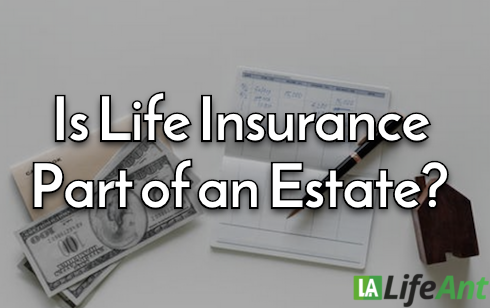People often question whether life insurance is part of an estate and whether it is available to cover a deceased individual’s debts, bills, and other financial obligations. The answer to this question hinges on whether a beneficiary of the life insurance policy was designated at the time of the policy holder’s death.
Is life insurance considered part of an estate? Below, let’s take a closer look at this issue to help readers determine if their life insurance policy or that of a loved one counts as a component of the estate.
Life Insurance as a Component of an Estate
 If the life insurance policy in question has one or several designated beneficiaries and one of those designated beneficiaries is alive at the time of the decedent’s death, that individual receives the life insurance proceeds. These proceeds are transmitted directly to the life insurance beneficiary without any need for the dreaded probate process. The probate process is centered on the decedent’s lines of credit and unpaid debts. The estate funds are used to pay these debts. The insurance proceeds that bypass the estate and are subsequently directly transmitted to the beneficiary will solely belong to that recipient.
If the life insurance policy in question has one or several designated beneficiaries and one of those designated beneficiaries is alive at the time of the decedent’s death, that individual receives the life insurance proceeds. These proceeds are transmitted directly to the life insurance beneficiary without any need for the dreaded probate process. The probate process is centered on the decedent’s lines of credit and unpaid debts. The estate funds are used to pay these debts. The insurance proceeds that bypass the estate and are subsequently directly transmitted to the beneficiary will solely belong to that recipient.
Thankfully, relatives, friends, and life insurance beneficiaries are not legally obligated to pay the debts left behind by the decedent. This means the decedent’s money cannot be touched by the creditors. However, there is the potential for a complication as some list their estate as the life insurance beneficiary. If the estate is the beneficiary, there is a good chance the proceeds from the decedent’s estate will be used to pay his or her final bills. Though it is possible to put up a legal fight against the proceeds being used to cover estate debts, the money will likely be used to cover the decedent’s financial obligations.
Life Insurance Without a Surviving Designated Beneficiary
If the decedent did not designate a beneficiary or if the designated beneficiary is no longer alive, the matter becomes that much more complicated. A couple of things can happen in such a situation. The insurance from the life insurance policy will pass directly to the probate estate. These funds will be used to cover the decedent’s remaining bills. Alternatively, life insurance proceeds can be directly passed onto the policy holder’s living heirs-at-law. These individuals are those of close relation to the decedent that have a legal entitlement to inherit his or her assets if he or she did not have a will.
The manner in which the life insurance proceeds are handled ultimately hinges on state law as well as the insurance provider’s unique payment policies. As long as the life insurance proceeds are payable to the heirs-at-law law as opposed to the estate, they will not be used to cover the decedent’s remaining financial obligations.
What Happens to Life Insurance Proceeds if a Beneficiary is not Designated?
Some life insurance policyholders fail to fill out a beneficiary designation form or wait until the last minute to change their beneficiary. A last-minute beneficiary change will likely be contested by the original beneficiary as well as the insurance provider. If the policyholder passes away and no one has been designated as the beneficiary of the life insurance policy, the proceeds will be transmitted to the decedent’s probate estate to cover final bills. However, the same rules detailed above are also applicable in this situation. If the policyholder failed to name one or several specific people on the beneficiary designation form, choosing instead for heirs-at-law to receive the money, the proceeds will be given to these individuals without interference from creditors.
When in Doubt, be as Specific as Possible
Do not assume your family, the insurance company, and state government representatives will be able to work out a fair resolution for your life insurance proceeds and assets after you pass away. Be specific when naming your life insurance beneficiaries. Name one or several beneficiaries on the life insurance policy and he or she will not have to wait an extended period of time hoping to receive the death benefit.
There is no reason to put loved ones through the drama of the egregiously slow probate process. It can take between several months and a year for the probate process to reach a conclusion. If your estate is especially large or complex, your loved ones will likely be waiting for an extended period of time to receive compensation of any sort. Furthermore, the probate process is not free. Fees must be paid to settle the estate, cover creditor claims, and so on. These fees will gradually reduce the life insurance policy death benefit, leaving the designated beneficiary with that much less money.


If life insurance policy proceeds from a decended is given to the State Controller of
California, and the estate is in probate can the heirs, receive the proceeds without going to probate?
If there were not beneficiaries named the proceeds go through the estate which is subject to the probate. Life insurance avoids the estate if living beneficiaries remain.